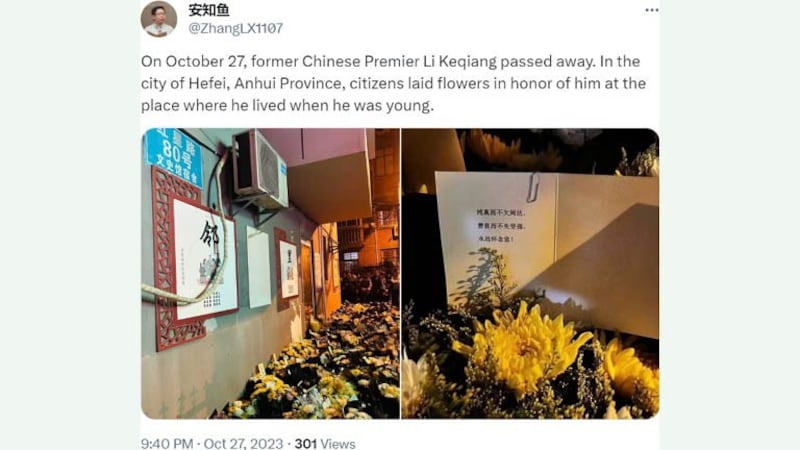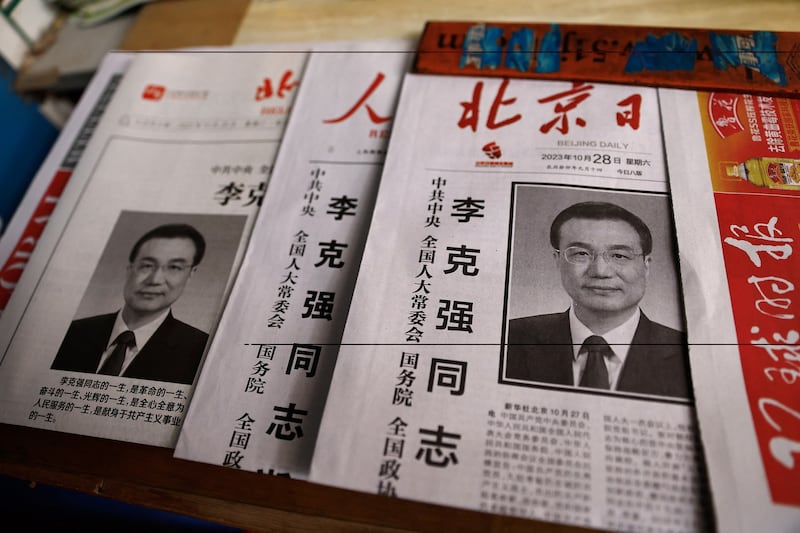Mourners in central and eastern China have been lining up to carpet public spaces with floral tributes to late former Premier Li Keqiang, who died suddenly of a heart attack last week, amid ongoing public dissatisfaction over Chinese leader Xi Jinping's handling of the economy.
Multiple photos uploaded to social media showed floral wreaths and bunches of chrysanthemums stacked up in Zhengzhou's Qianxi Square, one of the areas presided over by Li before he became premier under Xi, who has consolidated power in his own hands since taking the reins in 2012, moving away from the reform and opening up policies launched by late supreme leader Deng Xiaoping in 1979.
Photos uploaded to X, formerly Twitter, by citizen journalist account "Mr. Li is not your Teacher" showed people bowing to pay respects in front of stacks of flowers in Zhengzhou, with row upon row of floral pots and wreaths also shown in photographs attributed to residents of the eastern province of Anhui.
The account also showed police blocking a street in Shanghai with bicycles to prevent gatherings and cordon off parts of the city.
A veteran political journalist told Radio Free Asia that the authorities are well aware of the depth of public dissatisfaction, and have stepped up security measures to prevent a mass memorial gathering in Beijing or a similarly high-profile city.
"The reason the central government is allowing some mourning activities is to release some of the pressure of public feeling and prevent civil unrest," Gao Yu said in an interview on Monday. "They are allowing it, but not across the board."
"If they had just allowed it to go ahead, people would have taken it to Tiananmen Square by now," Gao said, adding that people are reacting against the status quo, and were taken by surprise at the suddenness of Li's death at the age of just 68.
"Li Keqiang's sudden death shocked China and the world, and this spontaneous public mourning shows how much people supported him," former ruling Chinese Communist Party school professor Cai Xia posted to her X account from the United States.
"It's not just about what they thought of [Li], but also the result of extreme worry about the direction China is going in, behind the wall."
‘I will never forget you’
Photos posted to social media by journalist Wang Zhi'an showed a giant portrait of Li along with slogans of mourning by the shores of Zhengzhou's Ruyi Lake in Zhengdong New District, while video clips showed hundreds lining up to place flowers, with people chanting: "United in love, supported by the people! Rest in peace, Premier Li Keqiang! The people of Zhengzhou will remember you!"
Mourners also converged on Li's former residence in Hefei, capital of the eastern province of Anhui, laying chrysanthemum bouquets in a continuous stream since Li's death in Shanghai in the early hours of Oct. 27, and on his ancestral home in Anhui's Dingyuan county, according to multiple posts by Baidu blogger Qiang Qiang Loves Science.

"Speaking for the 600 million in poverty, I will never forget you," read a message attached to one of the tributes, while another read: "We, the people of Hefei, would like to express our heartfelt respect to Premier Li."
Some quoted Li's comment that the Yangtze and Yellow rivers wouldn't flow backwards, in an indirect swipe at the economic policies of Xi Jinping, who took over responsibility for running the economy in recent years, a job that used to be the preserve of the premier.
Others quoted a comment made by Li shortly after he stepped down in 2022, which was also widely interpreted as an indirect comment on Xi's policy direction: "People act, and heaven is watching."
Some people in Hefei bowed and wept in front of a banner that read: "The premier who dedicated his whole life to the people," while others wept quietly, according to one video clip.
Yet the authorities have been working hard to ensure that such displays of public grief are limited to locations specifically associated with Li Keqiang's life and political career, and don't spread around the country like the "white paper" anti-lockdown protests of November 2022.
Government censors began deleting all but the most formulaic, state-backed expressions of grief from social media platforms on Friday, with reports emerging that universities are banning any kind of campus-based memorial activities for Li.
Honking horns
Meanwhile, Li's remains have arrived back in Beijing amid heavy traffic controls and tight security throughout the city, with thousands of drivers sounding their car horns as the motorcade passed by, Gao Yu told Radio Free Asia.
"There were traffic controls when the body was being brought back to Beijing," she said. "More than 10,000 vehicles were backed up [waiting] on the Fourth Ring Road."
"They sounded their horns when they saw the motorcade go by,” Gao said. “That was the only form of mourning that the government didn't stop them from doing."

A resident said police are now checking the identities of passers-by in sensitive areas of the city.
"It's awful right now," a Beijing resident who gave only the surname Wu for fear of reprisals said. "You need your ID card to go along Chang'an Boulevard, on both the north and south sides."
"They also check your ID if you want to turn into Nanchizi," he said, referring to a street that runs up the east side of the Forbidden City from Chang'an Boulevard, a few hundred meters (yards) from Tiananmen Square.
Meanwhile, U.S.-based veteran political commentator Hu Ping voiced some suspicions around the manner of Li's death.
"I was shocked to learn that Li Keqiang passed away suddenly due to illness – deeply surprised," Hu wrote in a commentary for RFA Mandarin.
"After all, Li Keqiang wasn't old – he was only 68," he said, citing a former classmate of Li's at Peking University as saying that Li had been swimming in a hotel pool when he had the heart attack.
"Surely Li Keqiang must have known about this for a while, given the level of medical care he would have had access to?"
"His entourage would surely have carried emergency medication with them," Hu wrote.
Translated with additional reporting by Luisetta Mudie. Edited by Malcolm Foster.
